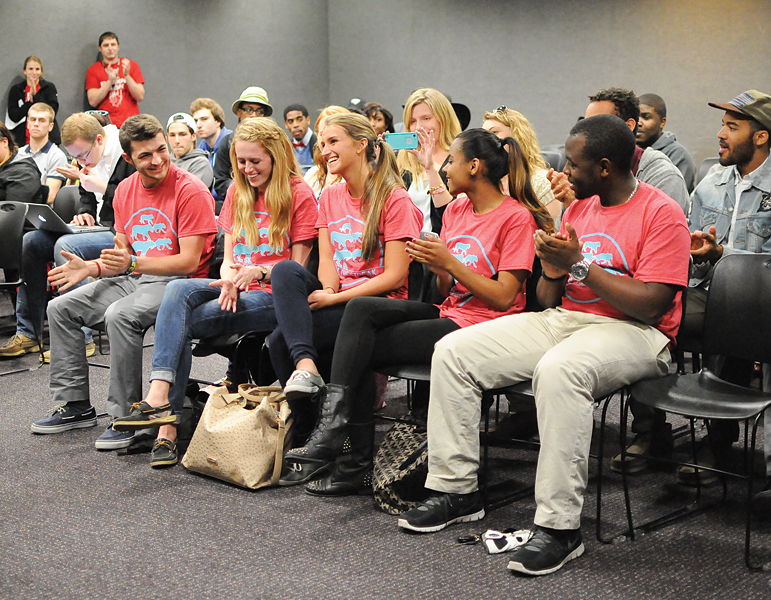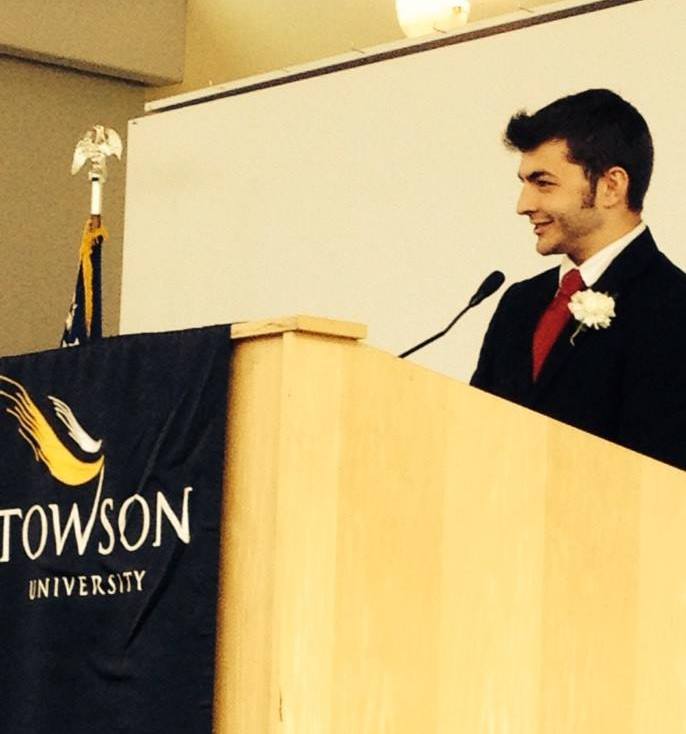
This article was posted with written permission from Jon Munshaw, Editor-in-chief, The Towerlight
Winning Streak
By Cody Boteler/Associate News Editor, The Towerlight
The STREAK ticket, featuring President Kevin Kutner, [Iota Sigma/Towson 2015], Vice President Becky Wiacek, Treasurer Joanna Enoch and Attorney General elect Bayan Rustom were elected with 1,543 student votes. Gayon Simpson was appointed chief of staff.
“We couldn’t be more excited, this came out kind of perfectly,” Kutner said after the announcement.
This was the first time in 20 years that an SGA executive cabinet ticket did not face any competition. The last was in 1994, when Katina Self’s ticket ran unopposed.
“We know this isn’t something normal,” Wiacek said in an interview prior to the election announcement. “We’ve seen SGA elections year after year and they’ve been heated and exciting, and you don’t know who’s going to win — so definitely for years to come we encourage people to reach out and try to be a part of the SGA.”
39 students ran for the 18 open senate seats.

Kutner said that the formation of the STREAK ticket was a deliberate, thought-out process.
“You know it’s all based on everyone’s qualifications and experience on campus,” he said.
Kutner and Wiacek said that they had unspecific conversations about running for president and vice president as far back as their freshman year, but according to Wiacek this ticket formally came together just before winter break.
The uncontested nature of the election came not from House of Cards-style drama, but from a variety of other factors.
“There were tickets in the works, but it just didn’t really work out, I think that’s all it was,” SGA Director of Academic Affairs Marissa Schickling said. Schickling is graduating in December and does not have any plans to return to the SGA next year.
One limiting factor was the time commitment.
“I was going to run for SGA president, and I had an entire ticket, but it fell apart because of the commitment aspect,” SGA Director of Legislative Affairs Zac McGee said. “There were people interested in running for a lot of great reasons, but the commitment was too much.”
McGee is not returning to the SGA, but is currently running uncontested in a race for president of the University System of Maryland Student Council. He said that he was going to run for president because he disagreed with Kutner on certain issues.
“We are both for students, but just in different ways,” he said.
The SGA president has 20 weekly office hours, the vice president and treasurer have 15 weekly office hours, and the attorney general and chief of staff have 10 weekly office hours.
The time commitment of the executive board proved to be too much for other members of SGA who may have been poised to run, too.
Joe Gros served as SGA director of community outreach for the 2013-14 year. He ran for a senate seat for 2014-15 year and won. Gros said that in his senior year, he would want to “have a little bit less responsibility.”
“I wanted to step back and be more of a supporting role,” he said.
Ben Mendelsohn, who ran for president for the 2013-14 school year and lost, provided an insider’s perspective of why some students in the SGA may choose not to run.
“It’s expensive. It’s time-consuming. My grades fell in the spring each time I ran. Not even because I skipped but because my attention just wouldn’t be focused there,” Mendelsohn said. “You also stress a lot of relationships over who is supporting who. People’s feelings can get hurt over it. There’s a lot of public speaking, there’s a lot of everything. It’s an experience that’s unrelatable.”
Another factor that may be at play in SGA elections is Greek Life, according to McGee.
“Our SGA, compared to others, comes down to Greek Life. It’s not like that everywhere,” McGee said. “I don’t know if it is good or bad. I would look closely at the letters that make it into the Senate next year. It’s part of the narrative that makes up the SGA.”
Kutner is in Theta Chi, Wiacek is in Kappa Delta and Enoch is treasurer in Phi Mu.
Many senatorial candidates who were at the SGA debate Monday night made a point to mention their fraternity or sorority affiliation and many candidates included their affiliation in their statements on the ballot.
Members of the elected executive cabinet said they did not think that Greek Life played such a large role in SGA elections.
“I don’t think [being in Greek Life] is a prerequisite [for being on the executive council or in the senate], however I think Greek Life does a great thing by [helping to] facilitate leaders,” Sampson, who is not affiliated with any fraternity, said.
Wiaceck said that she thought being in a sorority helped to make her a better leader, but that it isn’t the only reason she’s been successful as a member of SGA.
“I was in SGA for a year in a half before I even looked into being in Greek Life,” she said.
According to Kutner, numbers are enough to show that Greek Life isn’t the only factor in elections.
“There were 2,800 students who voted [last year], and I think that there are only 2,000 total students that are in Greek Life, and I know there’s no way all 2,000 of them voted,” he said. “Being involved in student groups helps you to get that voting base, but there are a lot of people who vote.”
On the other end of the spectrum, this year’s senatorial race saw 39 number of candidates for 18 seats. The disproportionate nature of the election reflects the changing nature of the SGA.
“This time around, the executive board doesn’t have as much power as in the past [when Matt Sikorski was president in 2011],” McGee said. “I wouldn’t say that’s the main reason why someone wouldn’t run, but it’s part of the evolution of SGA.”
McGee said that while current SGA President Charlotte Ridgeway could take positions and stances on issues, the senate’s vote would always be the final voice in the matter.
“The senate shapes the policy, and in the past it was much more executive board-driven,” he said.
Drew Voigt, a current senator who just won reelection said that there is an increase in students running for senate because they “are realizing that’s where the power is held.”
The number of students that ran for senate this year has the newly elected executive board excited.
“I think that next year with all these different ideas [in the senate], I think it’s going to be food for the exec. board and the Towson community,” Sampson said.
“I promise you this,” he added. “Next year there will be a contested SGA election.”
-Jonathan Munshaw contributed to this article.

Congratulations Brother Kutner!



